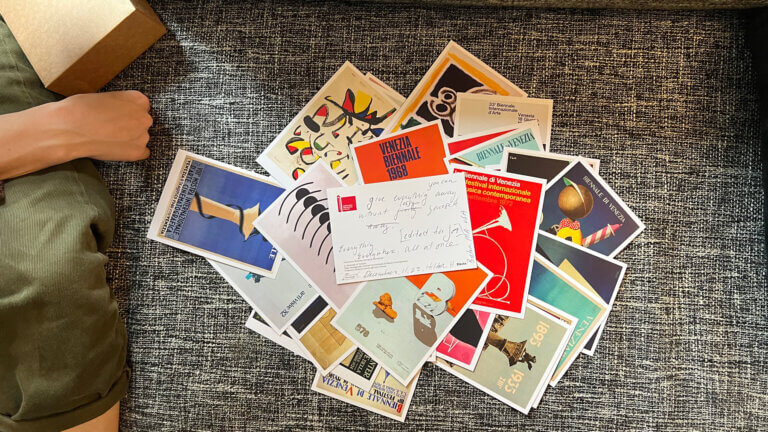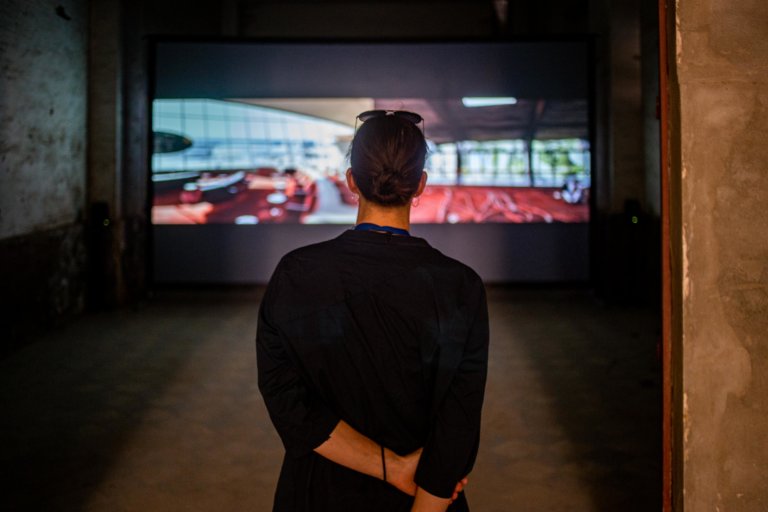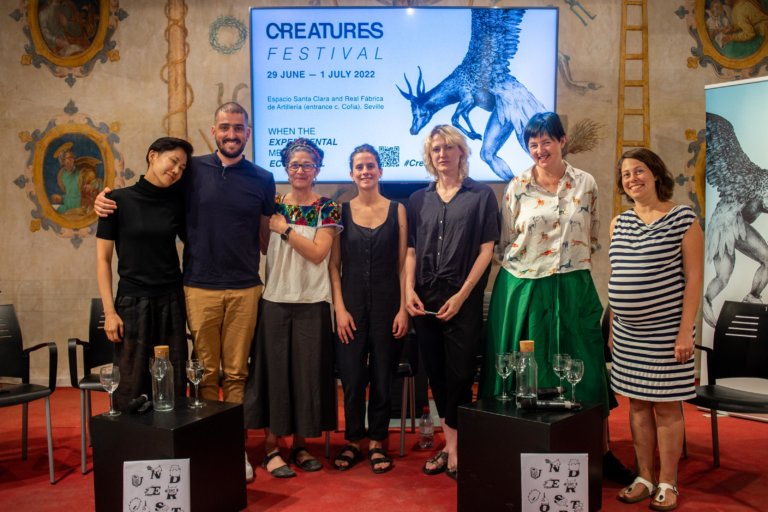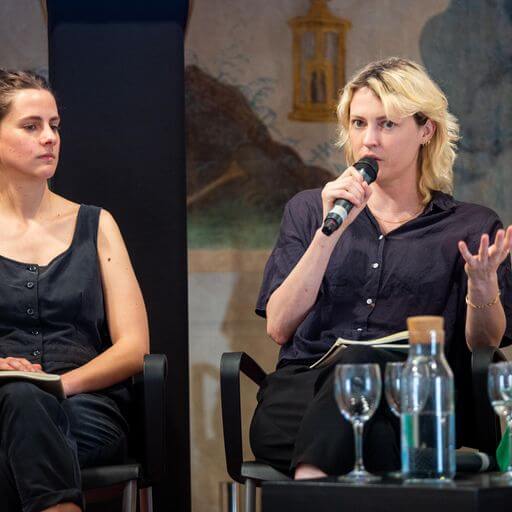Laine Rettmer
Give everything you can away without losing yourself
My message in a bottle in full, with all of the edits and all of the thinking about it, is on this La Biennale postcard from Venice, it says, “Give everything you can away without losing yourself.” That was the edit that I made, it says “edited for Jaz,” because the first part of it before I wrote that said “Give everything away without giving yourself away.” And then we both thought that maybe “giving yourself away” in English sounds like a magician or lying or has the implication of deception. So the edit that is really the message is give everything you can away without losing yourself, which I think linguistically gets closer to the concept I was trying to write about. The other thing that the postcard says is “everything everywhere all at once,” which was a note which made sense, but also as a note to watch something, because I’m always looking for the important things to look at.
To elaborate on that message that I put in the bottle: recently I have been wanting to balance or thinking that the balance between giving oneself creatively and trying to retain or maintain boundaries is more important for me than it used to be, because I think it’s very hard to not want to be in a situation where you’re making something and put all of your energy, which I think inside of a capitalist system, particularly the one in the United States, looks like all of your energy, all of your time, all of your resources go towards trying to make something outside your body that culminates in this event that is important—and if you don’t do it, then you’re failing. Recently, I’ve been trying to find more of a balance between thinking about my own body and also in taking care of my own body. What that means by taking care of other people inside of a system. So the idea of being able to give everything away that you can of yourself without losing what makes one feel centered inside of it, is what that message was about.
Let’s keep thinking through, let’s keep moving forward
There’s something that I think is constantly leading me towards where I’m going. It often feels like it’s not things that have happened, but things that I keep imagining. And I think that throughout my whole life, I feel like I’m trying to catch up to this idea of myself being in front of me. So talking about something that happened as I thought it was formative is kind of funny because I’ve often felt like the thing that happens is this: It’s not what it could be. And so there’s this constant thought “let’s keep thinking through, let’s keep moving forward.” […] And so those moments are very rare and often really informative for me when something can feel comparable to what I had hoped.
Combination of sound with language is very transparent
I would say that one of the reasons that I do what I do is that I had a very formative experience when I was moving from thinking about directing theater into only wanting to work with music where I felt systematically or in my body that difference of what it means to have a message delivered to you when someone’s singing versus when they’re speaking in words, and that this combination of sound with language is very transparent. And the transparency of emotion when it comes to storytelling is something that I have a very high regard for. So, for instance, if someone is lying in an opera, you know, musically that they’re lying like there’s a way in which that you’re very in on emotions because music is such an incredible … it’s almost like hard to understand, I think, how it functions for me on my body or other people’s bodies. But I do know that the way that it allows for something to move through your cells is unlike most things on the planet, because I think the way that reverberation works or the way that the actual physical sonic dynamics work in terms of the physics of music and sound changes the way that your body functions, like your your heartbeat will modulate itself to sometimes follow like a BPM of a song. So there’s a way in which that cellularly affects the way that you are. I mean, I know it happens emotionally too.
It’s about how you approach people
My experience has been more that when you try and have a conversation about ethics around work is that people are curious and want to. It’s also about how you approach people. So if you come to them and say “screw you,” of course they take negativity and they often produce negativity. But when you come with curiosity and questioning, not coming with an assumption that something’s been built off the desire to hurt someone, I find that people want to question those systems with you. So I’ve felt very lucky in moments where I had the desire to to change something and somebody wants to listen or we find a collaboration or we find a way of moving through what could be considered friction or chaos, but it actually ends up being productive towards good. It’s like chaotic good. That gets you to a different methodology of working with people.
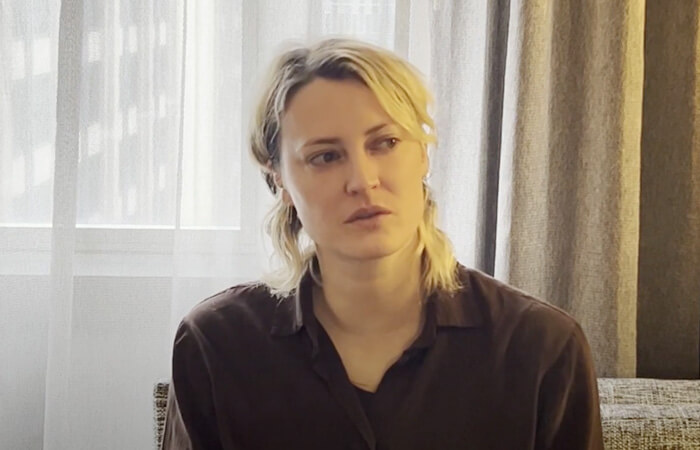
About Laine Rettmer
Laine Rettmer is an artist and opera director whose work has been presented nationally and internationally. Their stage productions have been praised as “wickedly smart” and “devastatingly funny” by The New York Times. Recent awards include two National Endowment for the Arts Grants and three MAP Fund grants for the multimedia production Standby Snow: Chronicles of a Heatwave and the experimental opera Ellis. They have been awarded numerous residencies and fellowships, including Robert Wilson’s Watermill Foundation, and been an invited artist the Vermont Studio Center. They hold a BFA in direction from New York University and an MFA in digital media from the SMFA at Tufts. They are currently the Assistant Professor in Residence in the Photography Department at the Rhode Island School of Design.
CreaTures resources
Pirici, A. (2022). Entanglement [Festival keynote]. CreaTures Festival, Sevilla, Spain.
Petroiusti, L. (2022). How do we encounter climate breakdown? How do we negotiate the impossibly complex? [Festival keynote]. CreaTures Festival, Sevilla, Spain.
Dolejšová, M., Ampatzidou, C., Choi, J. H-j., Botero, A., Beavers, I., Pokrywka, A., Van Amstel, F., Satomi, M. & Perner-Wilson, H. (2021). Feral Creative Practices Panel [Panel discussion]. Uroboros 2021 festival.
Choi, J. H. & Light. A. (2020). ‘The co-‘: Feminisms, Power and Research Cultures: A Dialogue. interactions 27(6). https://dl.acm.org/doi/10.1145/3429697
